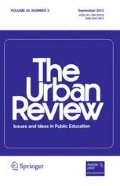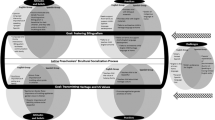Abstract
Parents’ cultural beliefs about children, education, and their caregiving roles can influence both the parent–child and parent-school relationships. Given the centrality of the mother–child relationship in Mexican families, mothers were situated as experts in their children’s development and education in the present investigation. Specifically, the childrearing and educational beliefs of six immigrant Latina mothers (five Mexican, one South American) of first-grade children were examined, as well as their beliefs about their roles in their children’s lives. Qualitative descriptive analyses revealed the women’s belief in the centrality of the maternal role, as well as the traditional cultural values of familismo and educación. Five themes that further illuminated the nature and functions of mothers’ cultural beliefs were generated; namely, the salience of relationships with significant others in achieving in school. Educators and schools might well build on this knowledge to create spaces that are open to the perspectives of Latina mothers, and to forge more effective and empowering partnerships with Latino/a families in children’s early and later school years.

Similar content being viewed by others
Notes
Although there were a total of seven Latina families in the ethnographic subset of STS families, the interview transcript of one Latina mother was purposively not selected for the present analyses, since the reported household income of the mother was disproportionately higher than that of the other mothers included in the ethnographic subsample. It is also important to note that I did not conduct the interviews; hence, this is a secondary analysis of qualitative interview data from the STS.
For clarity, the in-depth interview data analyzed here come from a single interview with each mother, conducted in the spring of their child’s first grade year.
References
Azmitia, M., Cooper, C. R., García, E. E., & Dunbar, N. D. (1996). The ecology of family guidance in low-income Mexican-American and European American families. Social Development, 5, 1–23.
Bornstein, M. H. (2006). Parenting science and practice. In I. E. Sigel & K. A. Renninger (Eds.), Handbook of child psychology, vol. 4: Child psychology and practice (pp. 893–949). NY: Wiley.
Borstein, M. H., & Cote, L. R. (2007). Knowledge of child development and family interactions among immigrants to America: Perspectives from developmental science. In J. E. Lansford, K. Deater-Deckard, & M. H. Bornstein (Eds.), Immigrant families in contemporary society (pp. 121–136). NY: Guilford.
Bronfenbrenner, U. (1986). Ecology of the family as a context for human development: Recent perspectives. Developmental Psychology, 22, 723–742.
Cabrera, N. J., & Garcia Coll, C. (2004). Latino fathers: Uncharted territory in need of much exploration. In M. E. Lamb (Ed.), The role of the father in child development (4th ed., pp. 417–452). Mahwah, NJ: Erlbaum.
Cabrera, N. J., Shannon, J. D., Mitchell, S. J., & West, J. (2009). Mexican American mothers’ and fathers’ prenatal attitudes and father parental involvement: Links to mother-infant interaction and father engagement. Sex Roles, 60, 510–526.
Caldera, Y. M., Fitzpatrick, J., & Wampler, K. S. (2002). Coparenting in intact Mexican American families: Mothers’ and fathers’ perceptions. In J. M. Contreras, K. A. Kerns, & A. M. Neal-Barnett (Eds.), Latino children and families in the United States: Current research and future directions (pp. 107–131). Westport, CT: Praeger Publishers.
Calzada, E. J., Fernandez, Y., & Cortes, D. E. (2010). Incorporating the cultural value of respeto into a framework of Latino parenting. Cultural Diversity and Ethnic Minority Psychology, 16(1), 77–86.
Capps, R., et al. (2005). The new demography of America’s schools: Immigration and the no child left behind act. Washington, DC: The Urban Institute.
Cauce, A. M., & Domenech-Rodríguez, M. (2002). Latino families: Myths and realities. In J. M. Contreras, K. A. Kerns, & A. M. Neal-Barnett (Eds.), Latino children and families in the United States: Current research and future directions (pp. 1–25). Westport, CT: Praeger Publishers.
Ceballo, R. (2004). From barrios to Yale: The role of parenting strategies in Latino families. Hispanic Journal of Behavioral Sciences, 26(2), 171–186.
Contreras, J. M., Kerns, K. A., & Neal-Barnett, A. M. (Eds.). (2002). Latino children and families in the United States: Current research and future directions. Westport, CT: Praeger Publishers.
Delgado Gaitan, C. (1994). Socializing young children in Mexican-American families: An intergenerational perspective. In P. M. Greenfield & R. R. Cocking (Eds.), Cross-cultural roots of minority child development (pp. 55–86). Hillsdale, NJ: Erlbaum.
Delgado-Gaitan, C. (1993). Parenting in two generations of Mexican American families. International Journal of Behavioral Development, 16, 409–427.
Delgado-Gaitan, C. (2004). Involving Latino families in schools: Raising student achievement through home-school partnerships. Thousand Oaks, CA: Corwin Press.
Delgado-Gaitan, C. (2005). Family narratives in multiple literacies. Anthropology and Education Quarterly, 36(3), 265–272.
DeSantis, L., & Ugarriza, D. N. (2000). The concept of theme as used in qualitative nursing research. Western Journal of Nursing Research, 22(3), 351–372.
Doucet, F., & Tudge, J. (2007). Co-constructing the transition to school: Reframing the novice versus expert roles of children, parents, and teachers from a cultural perspective. In R. C. Pianta, M. J. Cox, & K. L. Snow (Eds.), School readiness and the transition to kindergarten in the era of accountability (pp. 307–328). Baltimore, MD: Brookes Publishing Co.
Downe-Wamboldt, B. (1992). Content analysis: Method, applications, and issues. Health Care for Women International, 13, 313–321.
Durand, T. M. (2010). Celebrating diversity in early care and education settings: Moving beyond the margins. Early Child Development and Care, 180(7), 835−848
Falicov, C. J. (2005). Mexican families. In M. McGoldrick, J. Giordano, & N. Garcia-Preto (Eds.), Ethnicity and family therapy (3rd ed., pp. 229–241). NY: The Guilford Press.
Fuligni, A. J. (1997). The academic achievement of adolescents from immigrant families: The roles of family background, attitudes, and behavior. Child Development, 68(2), 351–363.
García Coll, C., Lamberty, G., Jenkins, R., McAdoo, H. P., Crinic, K., Wasik, B. H., et al. (1996). An integrative model for the study of developmental competencies in minority children. Child Development, 67, 1891–1914.
García Coll, C., & Pachter, L. M. (2002). Ethnic and minority parenting. In M. H. Bornstein (Ed.), Handbook of parenting, vol. 4 : Social conditions and applied parenting (2nd ed., pp. 1–20). Mahwah, NJ: Erlbaum.
Glaser, B. G. (1978). Theoretical sensitivity. Mill Valley, CA: Sociology Press.
Glaser, B. G., & Strauss, Anslem. L. (1967). The discovery of grounded theory: Strategies for qualitative research. NY: Aldine de Gruyter Press.
Goldenberg, C., & Gallimore, R. (1995). Immigrant Latino parents’ values and beliefs about their children’s education: Continuities and discontinuities across cultures and generations. Advances in Motivation and Achievement, 9, 183–228.
Gonzalez-Ramos, G., Zayas, L. H., & Cohen, E. V. (1998). Child-rearing values of low-income, Puerto Rican mothers of preschool children. Professional Psychology: Research and Practice, 29, 377–382.
Greenfield, P. M., Quiroz, B., & Raeff, C. (2000). Cross-cultural conflict and harmony in the social construction of the child. In S. M. Harkness, C. Raeff, & C. M. Super (Eds.), New directions for child and adolescent development, no. 87: Variability in the social construction of the child (pp. 93–108). San Francisco: Jossey-Bass.
Halgunseth, L. C., Ispa, J. M., & Rudy, D. (2006). Parental control in Latino families: Anintegrated review. Child Development, 77(5), 1282–1297.
Harwood, R., Leyendecker, B., Carlson, V., Asencio, M., & Miller, A. (2002). Parenting among Latino families in the US. In M. H. Bornstein (Ed.), Handbook of parenting: vol. 4. Social and applied parenting (2nd ed., pp. 21–46). Mahwah, NJ: Erlbaum.
Hernandez, D. J. (2004). Demographic change and the life circumstances of immigrant families. Future of Children, 14, 17–48.
Hernandez, D. J., Denton, N. A., & Macartney, S. E. (2008). Children in immigrant families: Looking to America’s future. Social Policy Report, 22(3), 1–23.
Holloway, S. D., Rambaud, M. F., Fuller, B., & Eggers-Pierola, C. (1995). What is “appropriate practice” at home and in child care?: Low-income mothers’ views on preparing their children for school. Early Childhood Research Quarterly, 10, 451–473.
Kearney, M. H. (2001). Levels and applications of qualitative research evidence. Research in Nursing and Health, 24, 145–153.
Lansford, J. E., Deater-Deckard, K., & Bornstein, M. H. (Eds.). (2007). Immigrant families in contemporary society. NY: Guilford Press.
Lareau, A. (2003). Unequal childhoods: Class, race, and family life. CA: University of California Press.
LeVine, R. A., & New, R. S. (Eds.). (2008). Anthropology and child development: A cross-cultural reader. Malden, MA: Blackwell Publishers.
Miller, A. M., & Harwood, R. L. (2001). Long-term socialization goals and the construction of infants’ social networks among middle-class Anglo and Puerto Rican mothers. International Journal of Behavioral Development, 25, 450–457.
Mosier, C., & Rogoff, B. (2003). Privileged treatment of toddlers: Cultural aspects of individual choice and responsibility. Developmental Psychology, 39, 1047–1060.
Okagaki, L., & Frensch, P. A. (1998). Parenting and children’s school achievement: A multiethnic perspective. American Educational Research Journal, 35(1), 123–144.
Oyserman, D., Coon, H., & Kemmelmeier, M. (2002). Rethinking individualism and collectivism: Evaluation of theoretical assumptions and meta-analysis. Psychological Bulletin, 128, 3–72.
Parke, R. D., & O’Neil, R. (1999). Social relationships across contexts: Family-peer linkages. In W. A. Collins & B. Lausen (Eds.), Relationships in developmental contexts: The Minnesota symposium on child psychology (Vol. 30, pp. 211–239). Mahwah, NJ: Erlbaum.
Peréz Carreón, G., Drake, C., & Barton, A. C. (2005). The importance of presence: Immigrant parents’ school engagement experiences. American Educational Research Journal, 42(3), 465–498.
Pianta, R. C., Cox, M. J., & Snow, K. L. (Eds.). (2007). School readiness and the transition to kindergarten in the era of accountability. Baltimore, MD: Brookes Publishing Co.
Raffaelli, M., Carlo, G., Carranza, M. A., & Gonzalez-Krueger, G. E. (2005). Understanding Latino children and adolescents in the mainstream: Placing culture at the center of developmental models. In L. A. Jensen & R. W. Larson (Eds.), New directions for child and adolescent development, vol. 109: New horizons in developmental theory and research (pp. 23–32). San Francisco: Jossey-Bass.
Rogoff, B. (2003). The cultural nature of human development. NY: Oxford University Press.
Sandelowski, M. (2000). Whatever happened to qualitative description? Research in Nursing and Health, 2, 334–340.
Savage, S. L., & Gauvain, M. (1998). Parental beliefs and children’s everyday planning in European American and Latino families. Journal of Applied Developmental Psychology, 19, 319–340.
Schulze, P. A., Harwood, R. L., & Schoelmerich, A. (2001). Feeding practices and expectations among middle-class Anglo and Puerto Rican mothers of 12-month-old infants. Journal of Cross-Cultural Psychology, 32, 397–406.
St. Pierre, R. G., Layzer, J. I., Goodson, B. D., & Bernstein, L. S. (1999). The effectiveness of comprehensive case management interventions: Evidence from the national evaluation of the comprehensive child development program. American Journal of Evaluation, 20, 15–34.
Taylor, R. D. (1997). The effects of economic and social stressors on parenting and adjustment In African-American Families. In R. D. Taylor & M. C. Wong (Eds.), Social and emotional adjustment and family relations in ethnic minority families (pp. 35–52). Hillsdale, NJ: Lawrence Erlbaum Associates.
US Census Bureau (2010) Facts for features: Hispanic heritage month 2010. Retrieved July 15, 2010 from http://www.census.gov/newsroom/releases/pdf/cb10ff-17_hispanic.pdf.
Valdés, G. (1996). Con respeto: Bridging the distances between culturally diverse families and schools. New York: Teachers College Press.
Valenzuela, A. (1999). Subtractive schooling: US-Mexican youth and the politics of caring. Albany: State University of New York Press.
Villenas, S. (2001). Latina mothers and small-town racisms: Creating narratives of dignity and moral education in North Carolina. Anthropology and Education Quarterly, 32(1), 3–28.
Villenas, S. A. (2005). Latina literacies in convivencia: Communal spaces of teaching and learning. Anthropology and Education Quarterly, 36(3), 273–277.
Villenas, S., & Moreno, M. (2001). To valerse por si misma between race, capitalism, andpatriarchy: Latina mother-daughter pedagogies in North Carolina. Qualitative Studies in Education, 14(5), 671–687.
Weber, R. P. (1985). Basic content analysis. Beverly Hills, CA: Sage.
West, M. M. (2001). Teaching the third culture child. Young Children, 55, 27–32.
Author information
Authors and Affiliations
Corresponding author
Rights and permissions
About this article
Cite this article
Durand, T.M. Latina Mothers’ Cultural Beliefs About Their Children, Parental Roles, and Education: Implications for Effective and Empowering Home-School Partnerships. Urban Rev 43, 255–278 (2011). https://doi.org/10.1007/s11256-010-0167-5
Published:
Issue Date:
DOI: https://doi.org/10.1007/s11256-010-0167-5




